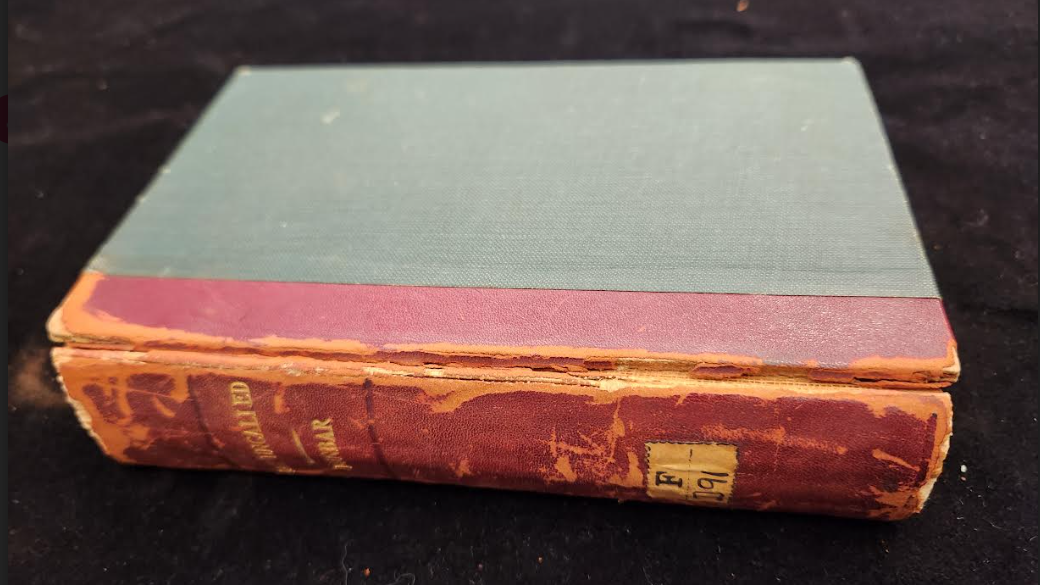
by Princess Zuri McCann, Special Collections Assistant

Paul Dunbar, The Uncalled: A Novel, New York: Dodd, Mead, and Company, 1898, Pequot Library Special Collections
Paul Laurence Dunbar was born in Dayton, Ohio on June 27, 1872. Dunbar was a poet and fiction writer known to use Black dialect in his work. He published several poetry books, short story collections and novels. He was criticized by some for his use of Black dialect in his poetry, especially because dialect was often used by white writers when writing about Black characters. According to the Library of Congress, where he worked from September 30, 1897 to December 31, 1898, Dunbar was the first African American poet to engage an international audience. In 1898, Dunbar married fellow poet and writer Alice Dunbar-Nelson. Dunbar-Nelson’s life is the focus of a current exhibition at the University of Delaware titled, Alice Dunbar-Nelson and the Legacy of Black Women’s Archives, on view from February 6 to August 9, 2024.
In 1900, the couple moved to Colorado, but, after she left him, he moved back to Daytonand lived with his mother. Dunbar spent many years dealing with tuberculosis and died on February 9, 1906, at the age of 33.
Two of Dunbar’s most popular poems are “Sympathy” and “We Wear the Mask.” He published many poetry books, including Lyrics of Lowly Life and his first collection, Oak and Ivy. He also wrote four novels: The Uncalled, followed by The Love of Landry, The Fanatics, and lastly, The Sport of the Gods. Three of Dunbar’s novels focused on the lives of white people and white society. It was not until his last novel that he wrote about Black people. The Sport of the Gods was also his most successful novel.
Dunbar’s friend, James Weldon Johnson, included his poems in The Book of American Negro Poetry. Johnson’s preface details his friendship with Dunbar and Dunbar’s contribution to African American poetry. Johnson acknowledged that Black writers exploring dialect was an outdated concept and because of it, Dunbar could not achieve the level of success he wanted.
The 1931 revised version of Johnson’s anthology includes the poems of thirty-one poets. The book begins with nine poems by Dunbar and ends with poems by Lucy Ariel Williams. Poets such as Phillis Wheatley are mentioned in the preface but missing from the rest of the book.
In the Preface to the Revised Edition (1931), Johnson reflected on the recognition of Black poetry and poets a decade after he first published the anthology:
“When this book was compiled, only ten years ago, the conception of the Negro as a creator of art was so new, indeed so unformed, that I felt it was necessary to make a rather extended introduction in presenting to the public an anthology of poetry by Negro writers” (p.3). Click here to read another Pequot Library Blog post about Johnson.

Maya Angelou, I Know Why The Caged Bird Sings, New York: Random House, 1969, Pequot Library Special Collections
Maya Angelou titled a couple of her memoirs after lines from Dunbar’s poem “Sympathy.” She also wrote her own poem,“Caged Bird,” using the themes from Dunbar’s poem, specifically the idea of a caged bird. She published “Caged Bird” in 1983.
The first of her seven memoirs, uses the first line of the final stanza in “Sympathy.” I Know Why the Caged Bird Sings was published in 1969 by Random House and shows a large black bird flying higher with a sun in the background. Angelou would also use another line from the final stanza of “Sympathy” for the title of her last memoir, A Song Flung up to Heaven. Angelou spends the first memoir retelling her experience as a child, along with her brother, of going back and forth between the homes of her grandmother, mother and father. While with her mother at the age of eight, she was sexually assaulted by her mother’s boyfriend and spent many years mute after the boyfriend’s body was found badly beaten. Though Dunbar’s original use of the caged bird as a representation for the enslaved, Angelou used the same image for her years of silence.
There are many reasons to criticize Dunbar, from his decision to write about white characters rather than Black ones early on in his career, to his violence against his wife, and even his use of dialect, but he was a major contributor to African American poetry and his poetry inspired great work.
Angelou, Maya (1969). I Know Why the Caged Bird Sings. New York: Random House. Pequot Library Special Collections.
Dunbar, Paul Laurence (1898). The Uncalled. New York: Dodd, Mead, and Company. Pequot Library Special Collections.
Johnson, James Weldon (1931). The Book of American Negro Poetry. New York: Harcourt, Brace, and Company. Pequot Library Special Collections.